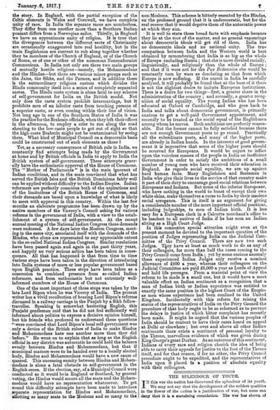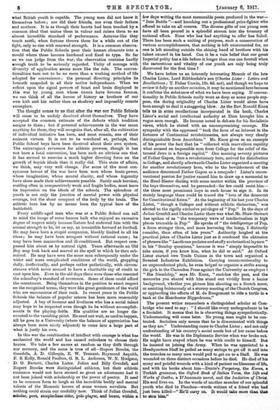111/. SPLENDOUR OF YOUTH.
TN this war the nation has discovered the splendour of its youth. 1 We may not say that the development of the noblest qualities in the flower of the nation is a justification of war, but none can deny that it is a sustaining consolation. The war has shown of what British youth is capable. The young men did not know it themselves before ; nor did their friends, nor even their fathers and mothers. It is as though their hearts had been touched by a common ideal that unites them in valour and raises them to an almost incredible standard of performance. Antaeus-like they touch earth, when fortune throws them for a while out of the fight, only to rise with renewed strength. It is a common observa- tion that the Public Schools pour their human elements into a mould where these become hardened and fixed to type. So far as we can judge from the war, the observation contains hardly enough truth to be seriously regarded. Unity of courage with diversity of application seems more like the rule. The conven- tionalities turn out to be no more than a working method of life adopted for convenience ; the personal directing principles lie beneath unspoiled in all their native independence. When we reflect upon the signal powers of heart and brain displayed in this war by young men whose names have become famous, we can think of all the heroes of history as brothers of our own kith and kin rather than as shadowy and impossibly remote exemplars.
The thought comes to us that after the war our Public Schools will cease to be unduly deceived about themselves. They have accepted the common estimate of the defects which tradition assigns to them ; but if personal achievements in the war mean anything for them, they will recognize that, after all, the cultivation of individual initiative has been, and must remain, one of their eminent virtues. It is not to be wondered at, perhaps, that Public School boys have been deceived about their own system. The extravagant reverence for athletic prowess, though it has not been a fatal convention, has been such an obvious one that it has seemed to exercise a much higher directing force on the growth of boyish ideals than it really did. This state of affairs, we think, may very well change. For some of the most con- spicuous heroes of the war have been men whose brain-power, whose imagination, whose mental clarity, and whose ingenuity have alone made their achievements possible. Surely such heroism, residing often in comparatively weak and fragile bodies, must leave its impression on the ideals of the schools. The splendour of youth is not only the junction of mental power with physical courage, but the sheer conquest of the body by the brain. The athletic hero has by no means been the typical hero of the battlefield.
Every middle-aged man who was at a Public School can call to mind the image of some human hulk who enjoyed an excessive degree of respect solely because Nature had endowed him with the animal strength to be, let us say, an irresistible forward at football. He may have been a stupid companion, blankly limited in all his ideas ; he may have been arrogant without rational cause ; he may have been mannerless and ill-conditioned. But respect com- passed him about as by natural right. Years afterwards an Old Boy may look back and marvel at the spell to which he then sub- mitted. He may have seen the same man subsequently under the wider and more complicated conditions of the world, grappling dully, ineffectually, and perhaps rather pathetically, with circum- stances which never seemed to have a charitable ray of credit to cast upon him. Even in the old days there were those who resented the schoolboy's standard of reverence. Some of them could afford the resentment. Being themselves in the position to exact respect on the recognized terms, they were like great gentlemen of the world who are unconscious of their rank. In recent years in the Public Schools the balance of popular esteem has been more reasonably adjusted. A boy of humour and liveliness who has a social talent may hope to be respected even though he be without accomplish. ments in the playing-fields. His qualities are no longer dis- counted to the vanishing-point. He need not wait, as used to happen, till he goes to a University (where the balance of appreciation has always been more nicely adjusted) to come into a large part of what is justly his own.
In this war the combination of intellect with courage is what has enchanted the world and has caused onlookers to choose their heroes. We take a few names at random as they drift through our memory, and the same is true of all—Rupert Brooke, the Grenfells, A. D. Gillespie, E. W. Tennant, Raymond Asquith, F. S. Kelly, Ronald Poulton, 0. R. L. Anderson, W. N. Hodgson, D. 0. Barnett, Charles Lister. Julian and Billy Grenfell, and Rupert Brooke were distinguished athletes, but their athletic eminence would not have seemed so great an adornment had it not been joined with scholarship or the power of poetry. It used to be common form to laugh at the incredible bodily and mental talents of the Homeric heroes of some women novelists. But nothing could strain our credulity now. Think of Julian Grenfell, scholar, poet, steeplechase-rider, polo-player, and boxer, within few days writing the most memorable poem produced in the war- " Into Battle "—and knocking out a professional prize-fighter who offered to take on all comers. The diverse gifts of our young men have all been poured in a splendid stream into the treasury of national effort. None who has had anything to offer has failed. There has been such a uniting of purpose, such a consecration of various accomplishments, that nothing is loft unaccounted for, no one is left standing outside the shining band of brothers with his talent unused in his hand. Can it be a vain belief that our great Imperial polity has a life before it longer than one can foretell when the earnestness and vitality of our youth are only being truly discovered for the first time ?
We have before us an intensely interesting Memoir of the late Charles Lister, Lord Ribblesdale's son (Charles Lister : Letters and Recollections ; T. Fisher Unwin, 12a. 6d. net), and though we hope to review it fully on another occasion, it may be mentioned here because it confirms the substance of what we have been saying. If conven- tionality in Public Schools really went as deep as some people sup- pose, the daring originality of Charles Lister would alone have been enough to deal it a staggering blow. As the Rev. Ronald Knox tells us in some recollections incorporated in the book, Charles Lister's social and intellectual audacity at Eton brought him a vogue soon enough. He became noted in deb ate for bis Socialistic views, which he stated with an uncompromising courage. His sympathy with the oppressed " took the form of an interest in the fortunes of Continental revolutionaries, not always very clearly distinguishable from Anarchists." Mr. Knox gives as an example of his power the fact that he " collected with marvellous rapidity what seemed an impossible sum from College for the relief of dis- tressed Jews in a foreign capitaL" One morning seventy pictures of Father Gapon, then a revolutionary hero, arrived for distribution in College, and shortly afterwards Charles Lister organized a meeting for another revolutionary hero, who to the bewilderment of the audience denounced Father Gapon as a renegade ! Lister's uncon- ventional passion for justice caused him to draw up a memorial to the Head-Master dealing with some matter within the province of the boys themselves, and he persuaded—for few could resist him— the three most prominent boys in each house to sign it. In its stately language there could be traced the "love of the democrat for Constitutional forms." At the beginning of his last year Charles Lister, " though a Colleger and without athletic distinction," was elected to the rigidly exclusive privileges of " Pop." In the days of Julian Grenfell and Charles Lister there was what Mr. Shaw-Stewart has spoken of as " the temporary wave of intellectualism in high places traceable in Pop." He speaks of " the intelligentzya of Pop, a force stronger then, and more leavening the lump, I distinctly consider, than often of late years." Authority laughed at the practical jokes of Charles Lister just as it condoned the obtrusion of phrases like " Laodicean prelates and stuffy ecclesiastical laymen " in his " Sunday questions," because it was " simply impossible to take amiss, if you knew him, what he did or said." At Oxford Lister started two Trade Unions in the town and organized a Sweated Industries Exhibition. Carrying unconventionality to an unprecedented pitch, he even helped to organize a strike among the girls in the Clarendon Press against the University as employer 1 " His friendship," says Mr. Knox, " enriches the past, and the memories you shared with him stand out vividly from a hazier background, whether you picture him shooting on a Scotch moor, or assisting boisterously at a stormy meeting of the Church Congress, or applauding the efforts of M. de Rougemont to ride a turtle in a tank at the Manchester Hippodrome."
The present writer remembers a distinguished scholar at Cam- bridge who used to say : " I should like every undergraduate to be a Socialist. It means that he is observing things sympathetically. Understanding will come later. No young man ought to be con- tented. Socialism only means that he is discontented with things as they are." Understanding came to Charles Lister ; and not only understanding of his country's social needs but of her cause before the world. He was in the Diplomatic Service when war broke out. He might have stayed where he was with credit to himself. But he insisted on joining the Army. When he was appointed to a Headquarters Staff he pulled as many strings to get off it and into the trenches as many men would pull to get on to a Staff. He was wounded on three distinct occasions before he died. He died of his many and painful wounds with a kind of patient recklessness of life, and with his books about him—Dante's Purgatory, the Koran, a Turkish grammar, the Oxford Book of Italian Verse, the Life and Works of Goethe, a D'Annunzio novel, and the Invitation of Christ. His soul lives on. In the words of another member of our splendid youth who died in Flanders—words written of a friend who had just been killed—" He'll carry on. It would take more than that to stop him."











































 Previous page
Previous page